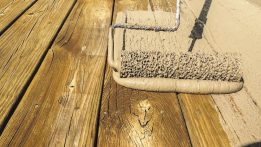 Florida’s wildlife and human populations encounter each other now more than ever before. From backyard wildlife viewing to observing wildlife while hiking in our local parks, seeing wildlife can be a wonderful and memorable experience. However, in some circumstances unexpected encounters or interactions between people and wildlife can create conflicts. Human-wildlife conflicts are as varied as the environment of Florida itself. Have you ever experienced deer eating your garden vegetables? Bats in your attic? Bears getting in your trash?
Florida’s wildlife and human populations encounter each other now more than ever before. From backyard wildlife viewing to observing wildlife while hiking in our local parks, seeing wildlife can be a wonderful and memorable experience. However, in some circumstances unexpected encounters or interactions between people and wildlife can create conflicts. Human-wildlife conflicts are as varied as the environment of Florida itself. Have you ever experienced deer eating your garden vegetables? Bats in your attic? Bears getting in your trash?
Most wildlife conflicts can be resolved by making simple changes, such as removing or securing wildlife attractants. Follow these tips on securing attractants:
- Feed pets indoors. If feeding pets outside or on a porch, remove the bowls after feeding.
- Use wildlife-resistant garbage cans or keep garbage cans in a shed or garage until the morning of pickup.
- Walk dogs on a short leash, and keep cats indoors. Supervise your pets when outdoors.
- Proactively maintain structures to prevent wildlife from entering and taking residence. Patch or seal exterior holes or gaps where wildlife can enter, paying special attention to soffit and gable vents, crawlspaces, and chimneys.
- If you have bird feeders, bring them in at night, or only provide enough food that can be eaten in a day and keep the ground beneath feeders clean.
 Securing attractants does not mean you can’t have a wildlife friendly yard that will attract desirable wildlife species, but it does mean that you must carefully plan your landscaping and other yard elements to ensure you are not attracting wildlife species that may create conflicts with you or your neighbors, or put the wildlife itself in harm’s way. It also means that you must secure your trash and any other items that may provide artificial food or shelter for unwanted wildlife. Anyone that has tried to deter squirrels, rodents, or even bears from their birdfeeders can appreciate how challenging it can be to try to attract one type of wildlife species without attracting others.
Securing attractants does not mean you can’t have a wildlife friendly yard that will attract desirable wildlife species, but it does mean that you must carefully plan your landscaping and other yard elements to ensure you are not attracting wildlife species that may create conflicts with you or your neighbors, or put the wildlife itself in harm’s way. It also means that you must secure your trash and any other items that may provide artificial food or shelter for unwanted wildlife. Anyone that has tried to deter squirrels, rodents, or even bears from their birdfeeders can appreciate how challenging it can be to try to attract one type of wildlife species without attracting others.

When human-wildlife conflicts occur, often the first thought is to remove the animal. Homeowners may go to their local hardware store and buy a trap or hire a nuisance wildlife control company. These are reactive responses—the benefits are typically short lived for the homeowner and often come with significant costs to the wildlife. When a wild animal is trapped and removed as a nuisance, it is typically killed or relocated offsite. Relocation of wildlife is stressful to the animal; relocated animals often do not survive due to competition for food and water resources, wild predators, or the animal may attempt to return to the original location which increases the chance of it getting hit by a car. If food or shelter continues to be available to wildlife frequenting your yard, trapping and removing wildlife will not be effective because when one animal is removed, another will quickly fill its place. Also, when animals are removed, homeowners may even see a shift in the species found in their yard. For example, removing snakes may lead to an increase in rodents.

So, what should people do to prevent conflicts with wildlife? The best solution is to be proactive. Understanding wildlife behavior and what attracts wildlife can help you appreciate and coexist with wildlife while reducing the potentially negative impacts. Securing attractants such as trash, gardens, and pet food will go a long way in reducing unwanted wildlife encounters. Keep cats indoors and walk dogs on a short leash. Making sure that your home or other structures on your property are properly maintained to prevent squirrels, bats, or other wildlife from taking up residence will also help. Taking these steps will help keep wildlife from lingering on your property and minimizes the need to remove or relocate wildlife.
 If you experience conflicts with wildlife or have questions about preventive steps you can take to prevent conflicts, the Florida Fish and Wildlife Conservation Commission’s (FWC) Wildlife Assistance Program is here to help! The FWC’s Wildlife Assistance Biologists work with individuals and communities to find sustainable resolutions and to develop strategies to coexist with native wildlife. Biologists are available over the phone and regularly conduct presentations for communities, municipalities, and homeowner’s associations. Wildlife Assistance Biologists can be reached by contacting your regional FWC office. Visit MyFWC.com/Contact and click on “Contact Regional Offices.”
If you experience conflicts with wildlife or have questions about preventive steps you can take to prevent conflicts, the Florida Fish and Wildlife Conservation Commission’s (FWC) Wildlife Assistance Program is here to help! The FWC’s Wildlife Assistance Biologists work with individuals and communities to find sustainable resolutions and to develop strategies to coexist with native wildlife. Biologists are available over the phone and regularly conduct presentations for communities, municipalities, and homeowner’s associations. Wildlife Assistance Biologists can be reached by contacting your regional FWC office. Visit MyFWC.com/Contact and click on “Contact Regional Offices.” ![]()
Greg Kaufmann
Wildlife Assistance Program Coordinator
Florida Fish and Wildlife Conservation Commission




